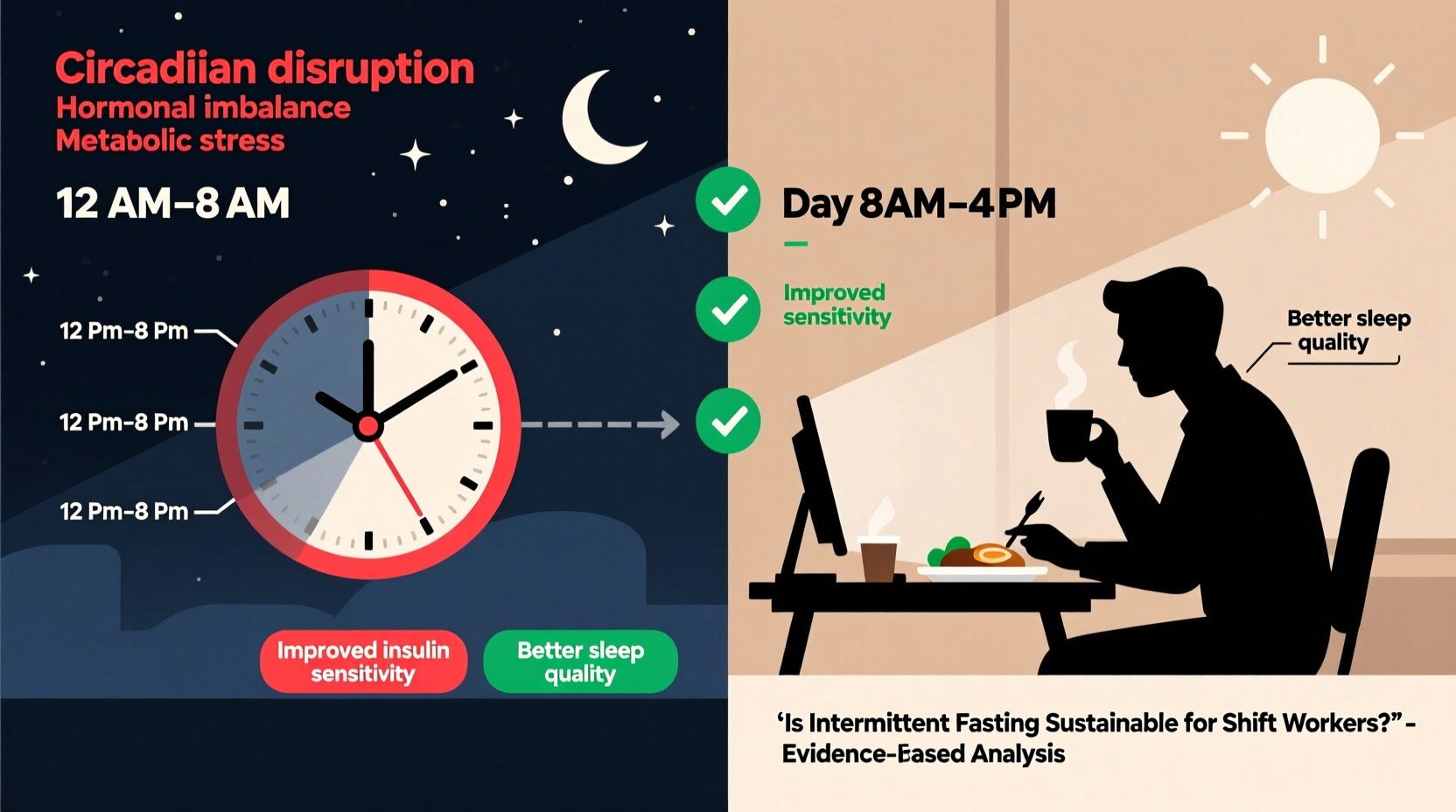For many, intermittent fasting (IF) has become a cornerstone of metabolic health, weight management, and longevity. By cycling between periods of eating and fasting, proponents report improved insulin sensitivity, enhanced mental clarity, and better energy regulation. But what happens when your schedule defies the typical 9-to-5 rhythm? For shift workers—nurses, paramedics, factory operators, truck drivers, and others working nights or rotating shifts—the question isn’t just whether IF works, but whether it’s sustainable or actively counterproductive.
The human body runs on circadian rhythms—internal clocks that regulate sleep, digestion, hormone release, and metabolism. These rhythms are closely tied to light exposure and meal timing. When night shifts disrupt this natural cycle, so too can dietary strategies like intermittent fasting. Yet, with careful planning, some shift workers find success. The key lies in understanding how fasting interacts with circadian biology, work demands, and individual physiology.
Circadian Rhythms vs. Fasting Windows: A Biological Conflict

The core challenge for shift workers practicing intermittent fasting is misalignment. Most popular IF protocols—such as the 16:8 method (fasting for 16 hours, eating within an 8-hour window)—assume that the eating window aligns with daylight hours. This syncs food intake with peak metabolic efficiency, typically occurring in the morning and early afternoon.
When you eat late at night or during a graveyard shift, your body processes glucose less efficiently. Research from Harvard Medical School shows that insulin sensitivity drops by up to 30% during nighttime hours, increasing the risk of blood sugar spikes and fat storage—even if total calorie intake remains unchanged.
“Eating at night goes against our evolutionary biology. Our digestive system expects rest when it’s dark, not a full meal.” — Dr. Satchin Panda, Circadian Biology Expert, Salk Institute
This doesn’t mean shift workers should never eat—it means they must be strategic. Attempting a daytime-style fast while working nights can backfire. For example, skipping dinner before a 7 p.m. shift may leave you underfueled and mentally drained. Similarly, breaking a fast at 3 a.m. with a large meal disrupts melatonin production and impairs sleep quality afterward.
When Intermittent Fasting Helps Shift Workers
Despite the challenges, intermittent fasting can offer benefits—if adapted correctly. Some studies suggest that time-restricted eating (TRE), a form of IF, may actually help stabilize metabolism in irregular schedules by enforcing consistency.
A 2020 pilot study published in Cell Metabolism followed 10 police officers on rotating shifts who adopted a 10-hour eating window aligned with their active hours. After 12 weeks, participants showed improvements in blood pressure, energy levels, and mood stability—even without changing diet composition.
The takeaway? Consistency matters more than the clock. If a night-shift worker eats all meals within a fixed 8–10 hour block—say, 8 p.m. to 4 a.m.—and maintains that routine even on days off, their body can recalibrate its metabolic expectations. This reduces internal conflict and supports better long-term health outcomes.
When It Becomes Counterproductive
Not every shift worker will benefit from intermittent fasting. In fact, for some, it can worsen fatigue, impair performance, and increase stress hormones like cortisol.
Common red flags include:
- Increased irritability or brain fog during shifts
- Poor sleep quality after eating late
- Overeating or bingeing once the fast ends
- Elevated heart rate or dizziness on duty
- Disrupted menstrual cycles (in women)
These symptoms often stem from combining fasting with chronically disrupted sleep. Sleep deprivation alone increases ghrelin (the hunger hormone) and decreases leptin (the satiety hormone), making appetite control harder. Adding fasting into this equation can create a metabolic double burden.
Additionally, many shift workers rely on quick bursts of energy—coffee, snacks, sugary drinks—to stay alert. Removing food without replacing that energy source can lead to crashes, especially during the second half of a 12-hour night shift.
Who Should Avoid or Modify IF?
| Group | Risk Factors | Recommendation |
|---|---|---|
| New shift workers | Still adjusting to sleep disruption | Postpone IF until schedule stabilizes |
| Diabetics or hypoglycemics | Blood sugar instability | Avoid prolonged fasts; consult physician |
| Pregnant or breastfeeding | Nutritional needs are higher | Not recommended |
| History of disordered eating | Fasting may trigger restrictive behaviors | Proceed with professional guidance |
| High-stress jobs (e.g., ER nurses) | Elevated cortisol + fasting = burnout risk | Use shorter fasts or skip entirely |
Adapting Intermittent Fasting for Shift Work: A Practical Guide
If you’re committed to trying intermittent fasting as a shift worker, success depends on customization—not conformity. The goal is to support energy, recovery, and metabolic health without compromising safety or performance.
Step-by-Step: Building a Sustainable IF Routine
- Map Your Shift Pattern: Identify whether you work nights, rotating shifts, or split shifts. Stability improves IF feasibility.
- Define Your Active Phase: Treat your waking, working hours as your “metabolic day,” regardless of sunlight.
- Set a Fixed Eating Window: Choose a consistent 8–10 hour window that fits your longest active period. Example: 9 p.m. to 7 a.m. for a night shift.
- Front-Load Nutrition: Eat larger, nutrient-dense meals earlier in your window. Prioritize protein, healthy fats, and complex carbs.
- Hydrate Strategically: Drink water, herbal tea, or electrolytes during fasting hours. Avoid caffeine close to bedtime.
- Sync Days Off: On non-work days, gradually shift eating times no more than 2–3 hours earlier/later to minimize circadian shock.
- Monitor Response: Track energy, sleep, mood, and digestion weekly. Adjust or pause if negative effects arise.
Mini Case Study: Maria, ICU Nurse on Rotating Shifts
Maria, 34, works three 12-hour night shifts per week, alternating with two day shifts. She tried standard 16:8 fasting but found herself exhausted by 2 a.m., struggling to focus during patient assessments. After skipping dinner pre-shift, she’d break her fast at midnight with fast food—leading to bloating and poor post-shift sleep.
She adjusted her approach: instead of fasting during her night shifts, she ate a balanced meal before starting (6 p.m.) and another mid-shift (12 a.m.), finishing by 4 a.m. Her eating window became 6 p.m. to 4 a.m.—10 hours aligned with her activity. On day shifts, she shifted the window to 8 a.m. to 6 p.m., overlapping only slightly.
Within four weeks, Maria reported better concentration, fewer cravings, and improved sleep duration. She wasn’t strictly “fasting,” but time-restricted eating within active hours reduced mindless snacking and stabilized her energy.
Her rule: No eating within 3 hours of bedtime, regardless of the clock. This simple boundary helped her wind down faster, even after early-morning finishes.
Checklist: Is IF Right for You as a Shift Worker?
Before starting, ask yourself these questions:
- ✅ Have I been on a stable shift pattern for at least 4 weeks?
- ✅ Can I maintain a consistent sleep schedule, even on days off?
- ✅ Do I have access to healthy meals during my shifts?
- ✅ Am I well-hydrated and managing stress effectively?
- ✅ Have I consulted a healthcare provider if I have diabetes, thyroid issues, or hormonal imbalances?
- ✅ Am I doing this for health—not just weight loss?
- ✅ Am I prepared to stop if I feel dizzy, weak, or overly stressed?
If most answers are “yes,” a modified version of intermittent fasting may be viable. If not, prioritize foundational habits first: hydration, whole foods, sleep hygiene, and stress reduction.
FAQ: Common Questions About IF and Shift Work
Can I fast during my off-days and eat normally on shifts?
This approach—known as “feast-famine cycling”—can disrupt metabolic balance. Frequent switching confuses your body’s insulin response and may increase fat storage. It’s better to maintain consistency across all days, adjusting slightly rather than drastically.
What should I eat during my eating window?
Focus on whole, minimally processed foods: lean proteins (chicken, fish, tofu), complex carbohydrates (oats, sweet potatoes, quinoa), healthy fats (avocado, nuts, olive oil), and fiber-rich vegetables. Avoid sugary snacks and refined carbs, which cause energy crashes.
Is one type of intermittent fasting better for shift workers?
The 14:10 or 10:14 method (14 hours fasting, 10-hour eating window) is often more sustainable than 16:8. It provides flexibility while still offering metabolic benefits. “Eat-stop-eat” (24-hour fasts) or alternate-day fasting are generally too extreme for irregular schedules.
Expert Insight: Aligning Lifestyle with Biology
“The best diet for a shift worker isn’t the one that fits a trend—it’s the one that fits their life. Intermittent fasting can work, but only if it respects the reality of their schedule and sleep needs.” — Dr. Cathy Goldstein, Neurologist and Sleep Specialist, University of Michigan
Experts agree: rigid adherence to popular fasting protocols can do more harm than good. Instead, the focus should be on time-restricted eating—a gentler, more flexible cousin of IF—that emphasizes regularity over restriction.
Conclusion: Make It Work—Or Let It Go
Intermittent fasting isn't universally sustainable for shift workers—but it’s not categorically counterproductive either. The truth lies in personalization. For those with stable routines, strong sleep hygiene, and access to nutritious food, a tailored approach can enhance energy and metabolic resilience.
But for others—especially those new to shift work, managing health conditions, or under high stress—fasting may add unnecessary strain. In such cases, prioritizing consistent meals, hydration, and recovery is far more impactful than chasing fasting benefits.
The goal isn’t to fit into a dietary mold. It’s to build a lifestyle that supports your unique demands. Whether that includes intermittent fasting or not, listen to your body above all else. Energy, focus, and long-term health are the real metrics of success.









 浙公网安备
33010002000092号
浙公网安备
33010002000092号 浙B2-20120091-4
浙B2-20120091-4
Comments
No comments yet. Why don't you start the discussion?